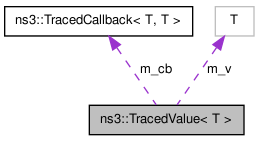trace classes with value semantics More...
#include <traced-value.h>
Collaboration diagram for ns3::TracedValue< T >:

Public Member Functions | |
| TracedValue (const TracedValue &o) | |
| TracedValue (const T &v) | |
| operator T () const | |
| TracedValue & | operator= (const TracedValue &o) |
| TracedValue (const IntegerValue &value) | |
| operator IntegerValue () const | |
| TracedValue (const UintegerValue &value) | |
| operator UintegerValue () const | |
| TracedValue (const BooleanValue &value) | |
| operator BooleanValue () const | |
| TracedValue (const EnumValue &value) | |
| operator EnumValue () const | |
| void | ConnectWithoutContext (const CallbackBase &cb) |
| void | Connect (const CallbackBase &cb, std::string path) |
| void | DisconnectWithoutContext (const CallbackBase &cb) |
| void | Disconnect (const CallbackBase &cb, std::string path) |
| void | Set (const T &v) |
| T | Get (void) const |
| TracedValue & | operator++ () |
| TracedValue & | operator-- () |
| TracedValue | operator++ (int) |
| TracedValue | operator-- (int) |
Detailed Description
template<typename T>
class ns3::TracedValue< T >
trace classes with value semantics
If you want to trace the change of value of a class or primitive type which have value semantics (they _must_ support operator !=), you can wrap them in an instance of this template: this instance will behave just like the original class (if it did not export any special method), and will define Connect/DisconnectWithoutContext methods to work with ns3::MakeTraceSourceAccessor.
The documentation for this class was generated from the following file:
- src/core/traced-value.h
 1.7.1
1.7.1